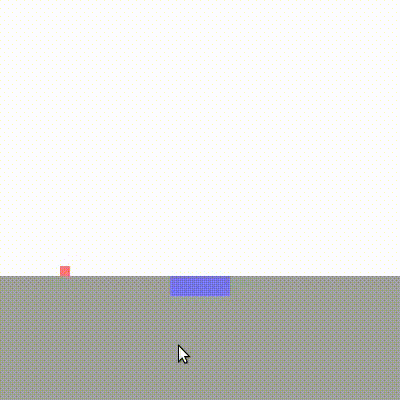TML is a Time Machine Library for SDL.
The library user can programmatically specify a point in time to travel, and then resume the simulation from there.
Simulations have two modes, which the programmer controls through the API:
- Record mode: The simulation time moves forward, and TML internally records all events and periodic memory snapshots. This is the initial mode.
- Time-travel mode: The simulation time freezes, and the programmer can specify a point in time to travel, which TML restores automatically.
When time travelling, TML restores the nearest snapshot in the past and then simulates the remaining events to reach the exact requested point in time. Because TML relies on memory snapshots and deterministic simulation, there are severe limitations in the programming API:
- No stateful calls are allowed (e.g.,
rand,fopen, etc). - All memory state must be static and/or preallocated.
- jump.c
UP: jumpLEFT: go back in time
- cards.c
DRAG: move cardsESC: switch mode- use media controls to time travel
Compile as follows:
$ chmod +x jump.c
$ ./jump.c
$ ./xjump
The programmer specifies a memory block, 4 callbacks, and then calls tml_loop
to pass control to the library:
// Simulation state
struct {
... // (e.g., positions, state machine, memory pools)
} G;
// Simulation callback
void cb_sim (tml_evt evt) {
... // given an input event, perform a simulation step
... // (e.g., change positions, transit state, allocate objects)
}
// Effects callback
void cb_eff (int trv) {
... // given the current mode, perform output effects
... // (e.g., screen redraw)
}
// Record mode callback
int cb_rec (SDL_Event* sdl, tml_evt* evt) {
... // given an SDL event, transform to a TML event
... // returns status to quit, switch mode, or continue
... // (e.g., receives SDL_KEYDOWN, returns TML_EVT_JUMP)
}
// Time-travel mode callback
int cb_trv (SDL_Event* sdl, int max, int cur, int* ret) {
... // given an SDL event, time travel to `ret` tick
... // receives max & cur simulation ticks
... // returns status to quit, switch mode, or continue
... // (e.g., go back in time given a special key)
}
int main (void) {
... // static initialization
tml_loop(50, sizeof(G), &G, cb_sim, cb_eff, cb_rec, cb_trv);
... // static finalization
}
- Loop call:
void tml_loop (
int fps, // desired frame rate
int mem_n, // simulation memory size in bytes
void* mem_buf, // pointer to memory contents
void (*cb_sim) (tml_evt), // simulation callback
void (*cb_eff) (int trv), // effects callback
int (*cb_rec) (SDL_Event*,tml_evt*), // record mode callback
int (*cb_trv) (SDL_Event*,int,int,int*) // time-travel mode callback
);
- Return status from
cb_recandcb_trv:
enum {
TML_RET_NONE = 0, // continue
TML_RET_QUIT, // quit simulation
TML_RET_REC, // switch to record mode
TML_RET_TRV // switch to time-travel mode
};
- Predetermined events passed to
cb_sim:
enum {
TML_EVT_INIT = 0, // initialization event (cb_sim must reset memory)
TML_EVT_TICK, // tick event generated every 1/fps
TML_EVT_NEXT // reserved for user-defined events
};
- User-defined events returned from
cb_recand redirected tocb_sim:
enum {
TML_EVT_XXX = TML_EVT_NEXT, // starts from reserved TML_EVT_NEXT
TML_EVT_YYY = ... // (change XXX,YYY to meaningful names)
};
- Event data type:
typedef struct {
uint8_t id; // TML_EVT_INIT, TML_EVT_TICK, TML_EVT_XXX, ...
union {
int tick; // current tick (TML_EVT_TICK)
int i1; // 1-int payload
struct {
int _1,_2;
} i2; // 2-int payload
struct {
int _1,_2,_3;
} i3; // 3-int payload
struct {
int _1,_2,_3,_4;
} i4; // 4-int payload
} pay;
} tml_evt;

